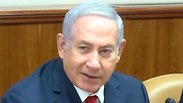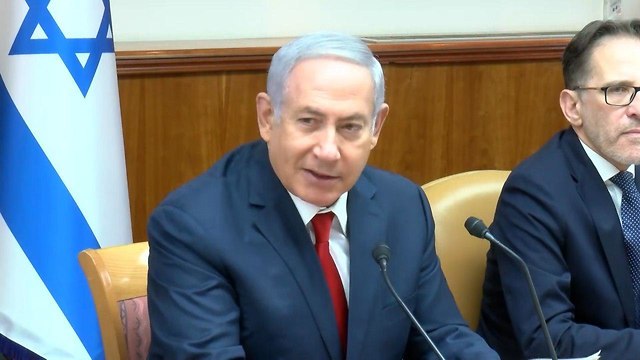"We are in the midst of a campaign against terror in Gaza. It entails an exchange of blows; it will not end in one strike. Our demand is clear—a complete ceasefire. We will not suffice with less than this,” said the prime minister at the start of the weekly Cabinet meeting.
“As of now, we have destroyed hundreds of Hamas military targets, and in each round the IDF exacts an additional heavy price. I will not reveal here our operational plans, they are ready. Our objective is to restore the quiet to residents of the south and the area adjacent to the Gaza Strip; this goal will be achieved in full,” Netanyahu concluded.
Culture and Sports Minister Miri Regev also addressed the situation in the south and reiterated Netanyahu's statement.
"The prime minister said what is important is the end result which is quiet for the residents of the south, the situation in the south is very complex and we must reimplement the targeted killings policy," Regev said. "The prime minister has a general set of decision making procedures. He consults with the chief of staff and the defense minister before making a final decision."
Minister Uri Ariel (Bayit Yehudi) protested against the current Egypt-brokered ceasefire between Israel and the Gaza Strip.
"There is no ceasefire … If someone comes to kill you, rise up and kill him first,” he exclaimed.
Ariel also commented on Saturday’s protests against the Nation-State Law which attracted tens of thousands.
“I was not surprised to see Palestinian flags during yesterday’s protest in Tel Aviv, but I was disappointed. Those who demonstrate with Palestinian flags give backing to the enemy who burns down our fields in the Gaza border region, harms and kills our soldiers. There is a need for decisive action, not containment,” he vented.
On Saturday, at the same time as the Nation-State protest, around 100 residents of the Gaza border communities demonstrated near the entrance of Tel Aviv HaShalom railway station Saturday night, protesting the continued escalation of hostilities along the southern border.
The rally’s organizers said the motivation behind the protest is "the government's helplessness in handling the security situation in the Gaza border region and the western Negev." Some demonstrators also held signs reading, "Israel is burning—we demand security."
Yair Farjun, head of the Hof Ashkelon Regional Council, said in an interview with Ynet on Sunday that socio-economic issues in the Gaza border communities need to be taken care of as well.
"There were escalation rounds in Jerusalem, Tel Aviv, in the north, in the Jordan Valley, in Lebanon. Now it is our turn … and we are willing to tolerate it.
“We are demanding that the government strengthen all the aspects, including socio-economic ones, of our region. The stronger we are, the more leverage the government will have during the negotiations," Farjun concluded.
Maj. Gen. (res.) Eitan Dangot said the current situation along the southern border is unusual due to Israel’s willingness to show restraint.
"I think that we are encountering something we have not witnessed in many years ... The state is trying to exhaust restraint without entering into a wide spread and radical confrontation. It is very unusual,” he asserted in the interview.


















